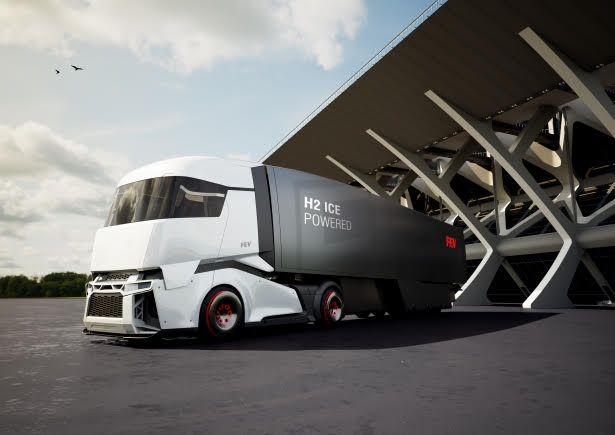Aachen, Germany, August 2021 – When it comes to reducing emissions across the automotive landscape, commercial vehicles play a critical role. The global enactment of regulations to limit CO2 emissions from new heavy-duty commercial vehicles in particular poses major challenges for OEMs. FEV, the internationally-active complete vehicle developer, offers a wide range of solutions for future commercial vehicles to meet even the strictest specifications among different applications. In addition to advanced powertrain and propulsion systems, this includes innovative aerodynamic approaches and predictive vehicle controls based on various parameters such as commercial vehicle routes.
Regardless of the type of drive, trucks of the future will be characterized by predictive control concepts based on vehicle networking. To this end, FEV is developing solutions that account for driving style in real time by collecting and evaluating parameters and infrastructure data via 4G/5G mobile networks; thus achieving maximum efficiency and minimizing operating costs for customers. Typical information that flows into the algorithms includes vehicle position, traffic signs, traffic light timing, and rate information from charging stations on both planned and alternative routes. Information on the number and behavior of other road users is also incorporated.
“By combining targeted navigation with assessed energy use, such as driving modes, routes for recuperation, or recharging at the charging point, the average range of commercial vehicles can be increased by double-digit percentage points. Sub-functions such as online estimation of actual vehicle mass and measurement of individual driving style also enable the prediction algorithms to be highly precise,” said Professor Stefan Pischinger, CEO of FEV Group. “In the future, it will become quite natural to include not only driving and resting times, but also the recharging time in logistics and route planning.”
Aerodynamic advantages of up to ten percent
Leveraging many years of experience in computational fluid dynamics (CFD), FEV can also achieve aerodynamic benefits for its customers, e.g., in the area of battery electric trucks, which require less frontal area for cooling and allow for increased cabin area thanks to reduced dimensional constraints. Reductions in drag as great as ten percent can be achieved, resulting in decreased energy consumption and increased range.
Holistic vehicle development made by FEV
On the drive side, future trucks will be battery-electric, powered by a fuel cell, or powered by a hydrogen combustion engine. Depending on the vehicle’s area of application and the distance to be covered, this leads to new tasks in addition to the classic areas of complete vehicle development, which FEV implements for its customers.
“Our customers appreciate the holistic vehicle development from a single source, and the associated time and cost advantages; especially when it comes to meeting new emission requirements,” said Professor Pischinger. “FEV has the expertise, and resources to bundle its competencies across disciplines, in order to deliver the optimal sustainable vehicle solution in accordance with the customer’s interest.”
In the case of battery-electric trucks, for example, this typically concerns performance and range. To address these requirements, FEV has developed a scalable modular battery system that enables the integration of existing and homologated batteries from the passenger car segment. A gateway solution for the battery management system (BMS) to coordinate the individual batteries was also developed within this framework. The approach has enabled FEV to significantly reduce its customers’ time-to-market. In addition, the development services provider is working on new Cell-to-Pack packaging concepts that allow for higher energy density at the battery level, and thus increase the long-distance suitability of commercial vehicles where needed.
Electric drives according to customer requirements
FEV also offers its customers various electric drive solutions. Depending on the vehicle and customer requirements, either centrally arranged drive units combined with conventional axles, or axles with an integrated electric motor and transmission are used. In many cases these electric drives also involve multi-gear transmissions, and for these instances, FEV has developed dog clutch and electro-mechanical actuation systems specially optimized for this purpose. Their advantage lies in their high efficiency and extraordinarily flexible application, since neither pneumatic nor hydraulic auxiliary energy is required from the vehicle. The technology is successfully used, for example, in an automated 3-speed transmission for heavy trucks with a weight capacity of up to 90 tons in mining applications. FEV has developed both the software and the hardware for this series application.
Range increase through thermal management
The company has successfully brought solutions on-road in the area of thermal system development. The intelligent interconnection of different circuits at different temperature levels can lead to significant energy savings in electric trucks. Examples include the use of waste heat from the battery or the electric motor via a heat pump to condition the cabin, which can increase both range and driver comfort.
About FEV
FEV is a leading independent international service provider of vehicle and powertrain development for hardware and software. The range of competencies includes the development and testing of innovative solutions up to series production and all related consulting services. The range of services for vehicle development includes the design of body and chassis, including the fine tuning of overall vehicle attributes such as driving behavior and NVH. FEV also develops innovative lighting systems and solutions for automated driving and connectivity. The electrification activities of powertrains cover powerful battery systems, e-machines and inverters. Additionally FEV develops highly efficient gasoline and diesel engines, transmissions, EDUs as well as fuel cell systems and facilitates their integration into vehicles suitable for homologation. Alternative fuels are a further area of development.
The service portfolio is completed by tailor-made test benches and measurement technology, as well as software solutions that allow efficient transfer of the essential development steps of the above-mentioned developments, from the road to the test bench or simulation.
The FEV Group currently employs 6,300 highly qualified specialists in customer-oriented development centers at more than 40 locations on five continents.

